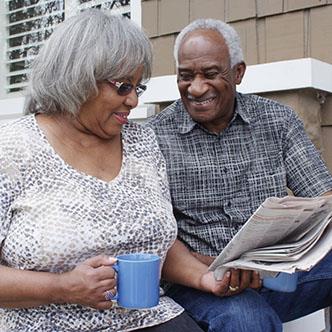
Being optimistic, having a sense of purpose in life and having good coping skills—all key traits of a person’s psychosocial health—are associated with better heart health among Black adults, regardless of where they live or their socioeconomic
status, according to a study published in Circulation: Cardiovascular Quality and Outcomes.
The study is among the first to show that psychosocial well-being, or resilience, may play a role in supporting heart health among Blacks. It further examines neighborhood-level resilience based on the burden of heart disease and stroke. Researchers defined
resilience as “the absence of adverse outcomes in the presence of exposure to risk.”
Higher levels of psychosocial resilience were more strongly associated with better overall heart health as measured by the American Heart Association’s Life’s Simple 7 metric. This composite score considers seven key risk factors for heart
and blood vessel disease: smoking status, physical activity, diet, body mass index, and control of blood sugar, cholesterol and blood pressure. This relationship between resilience and better cardiovascular health remained true even after accounting
for other factors, such as sex, age, education, income, employment, or marital status.
“Our findings highlight the importance of individual psychosocial factors that promote cardiovascular health among Black adults, traditionally considered to be a high-risk population,” they wrote.
Living in a so-called resilient neighborhood—one with low rates of heart disease or stroke and related deaths—also was associated with higher Life’s Simple 7 scores. In general, people living in neighborhoods with more socioeconomic
disadvantages have higher rates of heart attacks, strokes, and deaths.
The researchers then looked at individual and neighborhood-level resilience at the same time. Interestingly, they found that an individual’s psychosocial health was more strongly associated with cardiovascular health regardless of neighborhood factors.
Furthermore, in neighborhoods with high rates of heart disease and stroke, Black adults who were more resilient had a (predicted) 12.5% lower likelihood of developing heart disease compared with those who were less resilient in the same neighborhoods,
the study found. Authors said this finding is somewhat surprising given the wealth of data on the importance of environmental factors on cardiovascular health.
For their analysis, researchers recruited 389 volunteers living in the greater Atlanta area who identified themselves as being Black or African American. Participants were 53 years old on average and ranged from 30 to 70 years old. More than half (61%)
were women. None had heart or blood vessel disease.
All participants underwent a physical exam, had routine blood tests, and completed several standard questionnaires to gauge their psychosocial health. Questions focused on their level of optimism, how much control they believe they have over their own
environment, whether they feel they have a purpose in life, basic coping skills, and symptoms of depression. Heart health was based on their Life’s Simple 7 score.
Researchers said more research is needed, but these results carry important public health implications.
“Although policy-level interventions and systemic change that guarantee equal rights and improved access to healthcare, education, and other opportunities for minorities is the ultimate goal, interventions that promote positive well-being and capitalize
on psychosocial resilience at the individual level might prove beneficial for the cardiovascular health of Black Americans particularly for those living in communities with poorer cardiovascular health,” the authors write.
The study is limited by the small number of participants who were all from the Atlanta area. The researchers were not able consider other neighborhood factors, such as how walkable the community is, access to healthy foods, or air pollution, which can
impact psychosocial and overall health.
Visit CardioSmart.org/HealthyLiving to learn more.